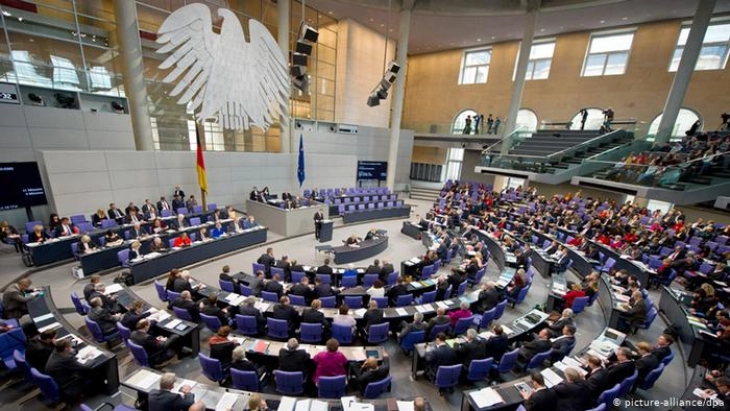Bundestag resolution a symbolic recognition of Macedonian identity, says FM Osmani
- The resolution of the German Bundestag supporting North Macedonia’s EU accession is just a symbolic recognition of what the negotiating framework formally states, because even without the resolution the Macedonian identity is guaranteed and when we become a member, it will only undergo greater promotion, said Minister of Foreign Affairs Bujar Osmani at a press conference Thursday in Struga.
- Post By Angel Dimoski
- 13:01, 15 June, 2023

Struga, 15 June 2023 (MIA) – The resolution of the German Bundestag supporting North Macedonia’s EU accession is just a symbolic recognition of what the negotiating framework formally states, because even without the resolution the Macedonian identity is guaranteed and when we become a member, it will only undergo greater promotion, said Minister of Foreign Affairs Bujar Osmani at a press conference Thursday in Struga.
In answer to a journalist’s question over the meaning of the resolution titled "Actively support North Macedonia on its path to the European Union" which the Bundestag is set to debate and adopt today, and the way in which “it will protect the Macedonian identity”, Osmani stressed that Germany is the country’s most consistent supporter.
“First, I want to thank the political parties who initiated this resolution in the German Parliament. I hope that it will be supported by all political parties in the Bundestag, which will send a serious message of support. These support resolutions are only a symbolic recognition of what the negotiating framework formally includes. Even without them, the identity within the EU is guaranteed, and once we become a member it will only be promoted more and more,” said Osmani.
Regarding the dilemmas which, he said, are present in the public, the FM explained some countries initiate such motions in order to tell the citizens: “it is true, the negotiating framework guarantees the identity attributes.”

“The language will become an official language of the EU, and this was proven with the signing of the Frontex Agreement. In a society with mutual understanding, there is no greater proof after the signing of the Frontex Agreement. But the opposition is abusing the topic, scaring the citizens and also refused to support the Frontex Agreement,” said Minister Osmani.
Osmani stressed the Frontex Agreement is “the most important agreement concerning the official use of the Macedonian language in the EU.”
“There is no need for more convincing, this issue is closed, but the opposition continues to sow fear and we end up pushing our friends to adopt such resolutions and affirm our identity. This is a result of unprincipled fearmongering when this issue has already been closed,” added Osmani.
Today, the German Bundestag will debate on several documents focusing on the Euro-integration and situation in the Western Balkans, including a resolution titled "Actively support North Macedonia on its path to the European Union", submitted by MPs from the ruling coalition from the ranks of the German Social Democratic Party (SPD), the Greens and the liberal Free Democratic Party (FDP).
With the documents, the German MPs call on the federal government to reach agreement at EU level that the EU accession prospects for North Macedonia, Albania, Bosnia and Herzegovina, Kosovo, Montenegro, and Serbia are "unequivocal, credible and underpinned with tangible progress".
"It is in the EU's own interest that the six Western Balkan countries - Albania, Bosnia and Herzegovina, Kosovo, Montenegro, North Macedonia and Serbia - which are not yet members of the EU but are directly surrounded by EU member states, achieve long-term stability, rule of law, peaceful settlement of disputes, solid democratic structures and economic prosperity. For this to happen, the goal must remain to include these countries in the EU," reads the document to be debated in the German Bundestag on Thursday.







